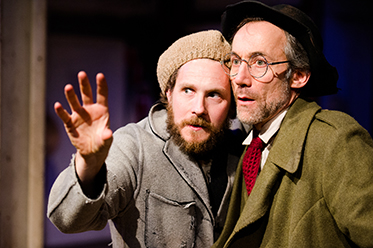 Central to George Tabori’s extraordinary play Mein Kampf is the notion that laughter is the only sane response to unspeakable horror. It’s certainly a refutation of the famous line by Theodor Adorno that ‘to write poetry after Auschwitz is barbaric’. Humour, black as burnt coal, is here seen as humanity’s only weapon against unsurpassed brutality.
Central to George Tabori’s extraordinary play Mein Kampf is the notion that laughter is the only sane response to unspeakable horror. It’s certainly a refutation of the famous line by Theodor Adorno that ‘to write poetry after Auschwitz is barbaric’. Humour, black as burnt coal, is here seen as humanity’s only weapon against unsurpassed brutality.
Set in Vienna in a hostel for the homeless, the play tells the tale of Shlomo Herzl [Steve Gome], who with the help of his friend Lobkowitz [David Kambouris], is attempting to write his memoir. They have just come up with the title of Mein Kampf when a short, irritable Austrian [Glenn van Oosterom] turns up, determined to apply the next day for a place in the Vienna Academy of Art.
It doesn’t take us long to realise we are at a pivotal moment in history, the rejection from Art school that supposedly set Adolf Hitler on a path of genocidal destruction and hate. What makes the play so disturbing is the unwitting but undeniable facilitation that Shlomo gives Hitler, the sense that Jewish kindness and amelioration lends succour to the future mass-murderer of the Jewish people. The moment when Shlomo washes Hitler’s feet is one of the most chilling in recent memory.
The play deploys a dizzying array of theatrical techniques, from Vaudeville to farce, drawing heavily on Yiddish humour but constantly widening its fields of reference. Nietzsche, Schiele, Strauss. But also Lubitsch and Chaplin. There hasn’t been a modern play as dense and rich, as attuned to the nuance and complexity of historical revisionism, since Peter Weiss’s Marat/Sade.
It is, therefore, commendable of 15 Minutes from Anywhere to remount this production for fortyfivedownstairs, after a sold-out season at La Mama. And in some way, they succeed, even if ultimately the play is beyond them.
The problem is mainly one of tone, an admittedly fiendish obstacle in Mein Kampf. Director Beng Oh does a reasonable job with the alarming shifts, but takes a while to establish the right mood, leaving the audience adrift for too long. The cast is also uneven, only occasionally rising to the requirements of the script.
Gome is a little too ineffectual in the role of the ineffectual Shlomo. The part is certainly a tricky one, but it requires a more consummate actor to pull it off. He brings pathos, but not the tragic note it needs. Van Oosterom’s Hitler is better, more modulated and attuned to the latent cruelty of the man, but still misses the mark slightly.
The two actors who really nail the tone of the play are Kambouris as God/Lobkowitz and Stephania Pountney as Herzl’s young lover Gretchen. Both manage to bring the right amount of theatricality to their roles without losing the satirical bite underpinning the piece. Sarah Bollenberg and Troy Larkin are also fine in support, the latter coming into his own in an extraordinary sequence involving a chicken carcass.
Overall, it’s a fascinating night in the theatre, intellectually challenging and emotionally devastating. The set by Peter Mumford is fine, and the costumes by Amaya Vecellio effective. And while Oh’s direction is not always precise, he makes good use of the large space, and doesn’t shy from the nastier aspects of the play. It’s certainly rare to see theatre with this much on its mind, or with a better grasp on the subversive power of laughter.
Director: Beng Oh Featuring: Sarah Bollenberg, David Kambouris, Steve Gome, Samuel Macdonald, Glenn van Oosterom, Stephania Pountney Set Design: Peter Mumford Lighting Design: Stelios Karagiannis Costume Design: Amaya Vecellio Sound Design: Natasha Moszenin Producer: 15 Minutes from Anywhere
Mein Kampf
fortyfivedownstairs, 45 Flinders Lane, Melbourne
Performance: Saturday 5 July 2014 – 8.00pm
Season continues to 13 July 2014
Bookings: (03) 9662 9966 or online at: www.fortyfivedownstairs.com
For more information, visit: www.fortyfivedownstairs.com or www.lamama.com.au for details.
Image: David Kambouris (Lobkowitz) and Steve Gome (Shlomo Herzl) – photo by Lachlan Woods
Review: Tim Byrne
